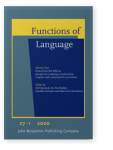Recycling through perspective persistence in Monsang (Trans-Himalayan)
Reconstructing the desiderative from a reported intentionality construction
In a reported intentionality construction, intentionality is expressed as reported speech/thought (‘s/he
says/thinks, <I will go>’). The quoted clause must contain a first person form and refer to the future. Reported
intentionality displays perspective persistence and an accompanying apparent form-meaning mismatch, as it structurally marks the
speech-act participant perspective of the volitional agent despite idiomatically translating only from the perspective of the
current speaker. While this construction has been examined in languages around the world, this is the first treatment for the
Trans-Himalayan (or Sino-Tibetan/Tibeto-Burman) language family. Monsang (South-Central; Northeast India) is shown to have a
reported intentionality construction of the cross-linguistic type. In addition, there is a desiderative construction in the
language that does not display perspective persistence but is argued to reconstruct back to a reported intentionality
construction. Further evidence from synchronic and diachronic quotative constructions in Monsang is presented that illustrates the
prominence of quotative-derived expressions of intentionality in Monsang verbal morphology.
Article outline
- 1.Introduction
- 1.1The reported intentionality construction
- 1.2Reported intentionality and related constructions in Trans-Himalayan
- 2.Reported intentionality in Monsang
- 2.1Reported speech/thought in Monsang
- 2.2Reported intentionality construction in Monsang
- 3.From the reported intentionality construction to desiderative marking
- 3.1Reconstructing the Monsang desiderative to a reported intentionality construction
- 3.2Functional difference
- 4.Reported speech and the expression of intentionality in Monsang
- 4.1Synchronic use of reported speech to indicate intentions and motivations
- 4.2Future constructions derived from reported speech/thought
- 5.Conclusion
- Acknowledgements
- Notes
-
References
References (31)
References
Aaron, Uche E. 1996. Grammaticization of the verb ‘say’ to future tense in Obolo. Journal of West African Languages 26(2). 87–93.
Adelaar, Willem F. H. 1990. The role of quotations in Andean discourse. In Harm Pinkster & Inge Genee (eds.), 1–12.
Bradley, David. 2003. Lisu. In Graham Thurgood & Randy J. LaPolla (eds.), The Sino-Tibetan languages, 222–235. London: Routledge.
Bybee, Joan L., Revere D. Perkins & William Pagliuca. 1994. The evolution of grammar : Tense, aspect, and modality in the languages of the world. Chicago: University of Chicago Press.
Chafe, Wallace L. 1980. The pear stories: Cognitive, cultural, and linguistic aspects of narrative production. Norwood, NJ: Ablex.
Chelliah, Shobhana L., David A. Peterson, Tyler P. Utt & Evaline Blair. 2019. Lamkang verb conjugation. Himalayan Linguistics 18(1). 

De Vries, Lourens. 1990. Some remarks on direct quotation in Kombai. In Harm Pinkster & Inge Genee (eds.), 291–309.
DeLancey, Scott. 2013. Creolization in the divergence of Tibeto-Burman. In Nathan Hill & Thomas Owen-Smith (eds.), Trans-Himalayan linguistics: Historical and descriptive linguistics of the Himalayan area, 41–70. Berlin: Mouton de Gruyter. 

DeLancey, Scott. 2015. The historical dynamics of morphological complexity in Trans-Himalayan. Linguistic Discovery 13(2). 60–79. 

Güldemann, Tom. 2008. Quotative indexes in African languages: A synchronic and diachronic survey. Berlin: de Gruyter Mouton. 

Haokip, Pauthang. 2018. Agreement in Kuki-Chin languages of Barak Valley. Journal of South Asian Languages and Linguistics 5(2). 159–210. 

Konnerth, Linda. 2014. A grammar of Karbi. Eugene, OR: University of Oregon PhD thesis.
Konnerth, Linda & Chikari Tisso. 2018. Karbi texts: A fully glossed corpus of different genres. Himalayan Linguistics Archive 17(2). 117–472.
Konnerth, Linda & Chikari Tisso. 2019. Karbi texts: Original recordings of a corpus of different genres. London: SOAS, Endangered Languages Archive. [URL]. 
Konnerth, Linda & Koninglee Wanglar. 2019. Person indexation in Monsang from a diachronic perspective. Himalayan Linguistics 18(1). 

Matisoff, James A. 1986. Hearts and minds in South-East Asian languages and English: An essay in the comparative lexical semantics of psycho-collocations. Cahiers de Linguistique Asie Orientale 15(1). 5–57. 

Matisoff, James A. 2003. Handbook of Proto-Tibeto-Burman: System and philosophy of Sino-Tibetan reconstruction. Berkeley, CA: University of California Press.
McGregor, William B. 1994. The grammar of reported speech and thought in Gooniyandi. Australian Journal of Linguistics 14(1). 63–92. 

McGregor, William B. 2007. A desiderative complement construction in Warrwa. In Jeff Siegel, John Lynch & Diana Eades (eds.), Language description, history and development: Linguistic indulgence in memory of Terry Crowley, 27–40. Amsterdam: Benjamins. 

Noonan, Michael. 2006. Direct speech as a rhetorical style in Chantyal. Himalayan Linguistics Journal 61. 1–32.
Ozerov, Pavel. 2019. Person indexation in Anal. Himalayan Linguistics 18(1). 26–53. 

Reesink, Ger P. 1993. ‘Inner speech’ in Papuan languages. Language and Linguistics in Melanesia 24(2). 217–225.
Rumsey, Alan. 2001. On the syntax and semantics of trying. In Jane Simpson, David Nash, Mary Laughren, Peter Austin & Barry Alpher (eds.), Forty years on: Ken Hale and Australian languages, 353–363. Canberra: Pacific Linguistics.
Saxena, Anju. 1988. On syntactic convergence: The case of the verb ‘say’ in Tibeto-Burman. Annual Meeting of the Berkeley Linguistics Society 141. 375–388. 

Saxena, Anju. 1995. Unidirectional grammaticalization: Diachronic and cross-linguistic evidence. STUF-Language Typology and Universals 48(4). 350–372. 

Serzisko, Fritz. 1987. The verb ʻto sayʼ in Ik (Kuliak). Afrikanistische Arbeitspapiere 111. 67–92.
Singh, Naorem Saratchandra. 2006. A grammar of Paite. New Delhi: Mittal Publications.
Spronck, Stef. 2015. Reported speech in Ungarinyin: Grammar and social cognition in a language of the Kimberley Region, Western Australia. Canberra: Australian National University PhD thesis.
Cited by (1)
Cited by one other publication
Spronck, Stef & Daniela Casartelli
2021.
In a Manner of Speaking: How Reported Speech May Have Shaped Grammar.
Frontiers in Communication 6

This list is based on CrossRef data as of 4 july 2024. Please note that it may not be complete. Sources presented here have been supplied by the respective publishers.
Any errors therein should be reported to them.
